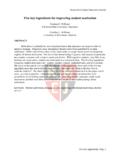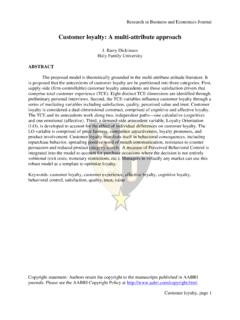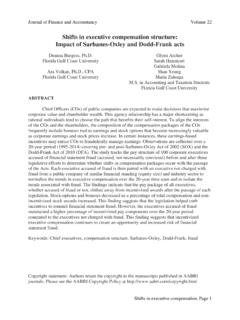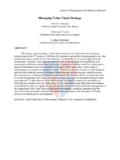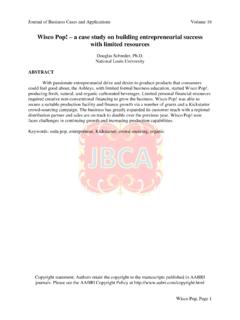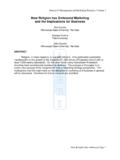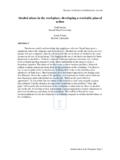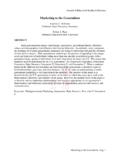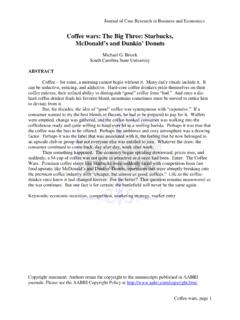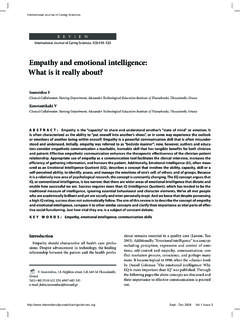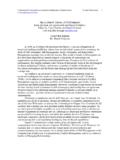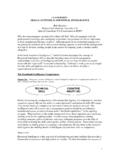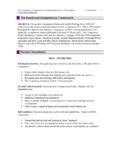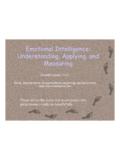Transcription of The effects of emotional intelligence, age, work ...
1 Research in Higher Education Journal The effects of emotional intelligence , Page 1 The effects of emotional intelligence , age, work experience, and academic performance Natalie L. Shipley NexTech Systems Mary Jo Jackson University of South Florida St. Petersburg Sharon Larisa Segrest University of South Florida St. Petersburg ABSTRACT In recent years, emotional intelligence (EI) has been a popular topic of debate in the field of management. It has been praised as a successful predictor of job performance and leadership ability. Authors have also claimed that emotional intelligence predicts success at school. However, little empirical research has been conducted to test this assertion.
2 In this study, the relationship between emotional intelligence , as measured by the Trait emotional intelligence Questionnaire Short Form (TEIQue SF) and academic performance were examined in a sample of undergraduate business students (N=193). emotional intelligence was found to be positively associated with work experience. Despite this finding, emotional intelligence was not significantly associated with age. Global trait emotional intelligence was not significantly associated with academic achievement, however, students in the mid-range GPA had a significantly higher mean well-being factor score than students in the lower and higher-range GPA. Implications and recommendations for developing emotional intelligence in students are discussed.
3 Keywords: trait emotional intelligence , academic performance, age, work experience Research in Higher Education Journal The effects of emotional intelligence , Page 2 INTRODUCTION Academic articles exploring the concept of emotional intelligence began to appear in the early 1990s. Little was known about the concept in the general public or academia until it was popularized in 1995 by Daniel Goleman s book, emotional intelligence : Why it can matter more the IQ. The book captured the attention of the general public, media, and researchers by claiming that emotional intelligence can be as powerful, and at times more powerful, than IQ in predicting how successful one is in life (Goleman, 1995, p.)
4 34). Goleman (1998) asserts that emotional intelligence , not IQ, predicts workplace success and who transpires as a leader. In a study of Harvard graduates in the fields of law, medicine, teaching, and business, scores on entrance exams had zero or negative correlation with their eventual career success (Goleman, 1998). In Working with emotional intelligence , Goleman quoted Lyle Spencer Jr., president of Spencer Research & Technology and co-founder of Competency International, as saying: What you learned in school distinguishes superior performers in only a handful of the five or six hundred jobs for which we ve done competence studies. It s just a threshold competence; you need it to get in the field, but it does not make you a star.
5 It s the emotional intelligence abilities that matter more for superior performance (1998, p. 19). A multitude of studies suggest that EI is a strong predictor of job performance. In a study that examined workers in a cigarette factory in China, EI was found to predict employee performance (Law, Wong, & Song, 2004). Another study found that partners in a multinational consulting firm who scored higher than the median on an EI measure produced $ million more in business than the other partners did (Cherniss). Greenstein (2001) conducted a study that looked at the successes and failures of eleven American presidents. They were assessed on six qualities: organization, communication, vision, political skill, cognitive style, and emotional intelligence .
6 The results showed that emotional intelligence was the key quality that distinguished the successful ( , Roosevelt) from the unsuccessful ( , Carter). In a study by Elfenbein and Ambady (2002), the ability to perceive emotions in others facial expressions and pick up subtle signals about people s emotions predicted peer ratings of how valuable these people were to their organization. Lastly, a neta-analysis of 59 studies by Van Rooy and Viswesvaran (2004) found that emotional intelligence correlated moderately with job performance. In addition, research suggests that emotional intelligence abilities lead to superior performance even in the most intellectual careers. In a study begun in the 1950s at the University of California at Berkeley, eighty students in science completed a series of IQ tests, personality tests, and extensive interviews with psychologists who assessed them on such qualities as emotional balance and maturity, integrity, and interpersonal effectiveness (Goleman, 1998).
7 Forty years later, a follow-up study was conducted using the same former students. Each person s career success was evaluated by resumes, evaluations by experts in their respective field, and sources such as American Men and Women of Science. The result: emotional intelligence abilities were four times more important than IQ in determining professional success and prestige even for these scientists (Goleman, 1998, p. 45). While some research has found emotional intelligence is positively correlated with academic performance the results have been mixed. In addition, it has been suggested that Research in Higher Education Journal The effects of emotional intelligence , Page 3 emotional intelligence can increase as experience increases for a maturity effect (Goleman, 1995).
8 The primary purpose of the research is to empirically examine emotional intelligence as it relates to work experience and academic performance. First, we define emotional intelligence and briefly review Trait EI versus Ability EI. Then, literature relating to emotional intelligence to work experience and academic performance is reviewed for the development of our hypotheses. After reporting the results of our study, our paper concludes with a discussion of the implications of this research and directions for future research. Definition of emotional intelligence Critics of emotional intelligence claim that it is too vague a concept, it cannot be measured, and the validity of it is suspect (Robbins & Judge, 2009).
9 Some researchers argue that the concept of EI is unclear and achieving a definition of it is very difficult because different researchers focus on different skills. One researcher may focus on self-control, while another may study empathy. Some critics question whether EI can be properly measured. They argue that if EI is in fact a form of intelligence , then EI tests must have right and wrong answers. Although there are EI tests that have right and wrong answers, critics still question the validity of these tests. Finally, some researchers contest the validity of emotional intelligence on a basis of it being so closely related to intelligence and personality (Robbins & Judge, 2009).
10 Despite these criticisms of emotional intelligence , there is research that suggests it is a valid concept and plays an important role in the workplace. emotional intelligence can be described as having four branches: the ability to accurately perceive and express emotion, assimilate emotion into thought, understand emotion, and regulate emotions in the self and others (Mayer & Salovey, 1997). Perceiving emotion is the ability to identify emotion in the self and others. Facilitating emotion is the ability to use information that explains felt emotions in order to prioritize and direct thinking. Understanding emotion is the ability to understand relationships among emotions and how emotions transition from one state to another.
